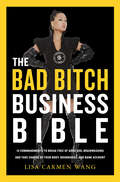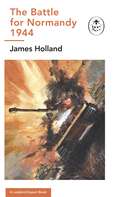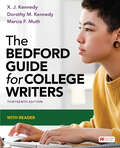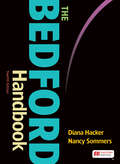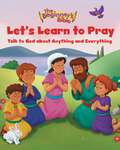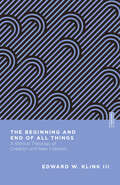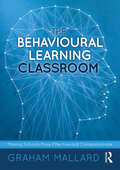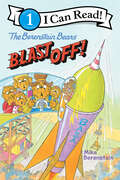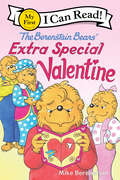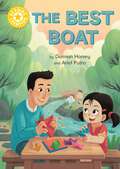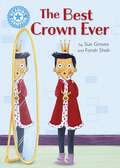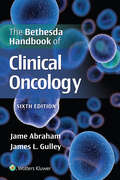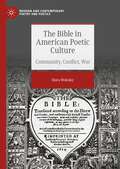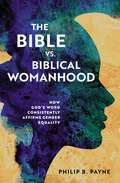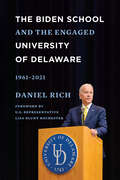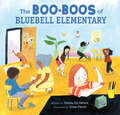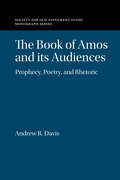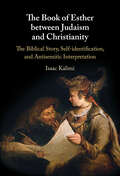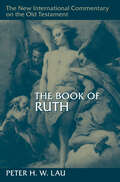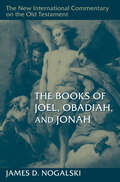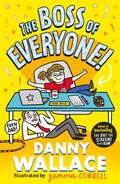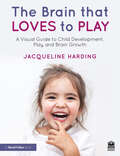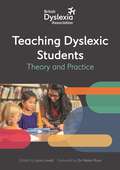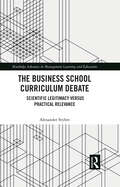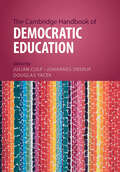- Table View
- List View
The Bad Bitch Business Bible: 10 Commandments to Break Free of Good Girl Brainwashing and Take Charge of Your Body, Boundaries, and Bank Account
by Lisa Carmen WangChampion gymnast turned serial entrepreneur and investor Lisa Carmen Wang empowers women to break free of Good Girl Brainwashing—perfectionism, people-pleasing, permission-asking—to become their most authentic and powerful selves.“A woman steps into her full power not when she is finally given permission to do so, but when she realizes she never needed it in the first place.”Lisa Carmen Wang was raised to be a good girl, praised for her obedience, politeness, modesty—traits that became the bedrock of her personality. But as she grew up, the never-ending pursuit of being the perfect good girl left her feeling hollow, despite her achievements as a champion gymnast, straight-A student, and Ivy League graduate. Her fears of failure and rejection and her worries about other peoples’ opinions held her back from embracing her most authentic and powerful self at work and in life.But all that changed when Lisa realized she was capable of so much more; that deep inside a Bad Bitch was waiting to be unleashed.The culmination of decades of training as an elite athlete, business leader, serial entrepreneur, and certified executive coach, The Bad Bitch Business Bible is Lisa’s no-holds-barred guide for women who want to break free of Good Girl Brainwashing and take charge of their bodies, boundaries, and bank accounts. Interweaving intimate personal stories with large life lessons, Lisa shows you how to transform from insecure good girl to unapologetic Bad Bitch so you can start earning the money, power, and respect you deserve. Whether you’re launching your first business, transitioning in your career, trying to find your community, or making a life change, The Bad Bitch Business Bible is an invaluable resource that teaches you how to tap into the most powerful version of yourself and become the Bad Bitch you were born to be.
The Battle for Normandy, 1944: (WW2 #9) (The Ladybird Expert Series #15)
by James HollandBOOK 9 OF THE LADYBIRD EXPERT HISTORY OF THE SECOND WORLD WAR, FROM AWARD-WINNING HISTORIAN JAMES HOLLANDFeaturing stunning illustrations from Keith Burns, bringing the story to life in vivid detailWhy did the Allies attack on D-Day?How did the Allies pick Normandy as a target?What was Operation Overload, the second front against the Nazis?JUNE 6 1944D-Day was a deciding conflict in World War II. But the invasion was not a straightforward attack.From feeding Nazi spies false information on the attack, to developing new technology like the Mulberry harbours, D-Day changed the course of the War for good.THE LARGEST SEABORNE INVASION IN HISTORYWritten by historian, author and broadcaster James Holland, The Battle for Normandy is an essential introduction to the naval invasion that began the liberation of Western Europe from the Nazis.__________Discover the full Ladybird Expert WW2 series:BlitzkriegThe Battle of BritainBattle of the AtlanticThe Desert WarThe Eastern FrontThe Pacific WarThe Bomber WarThe War in ItalyThe Battle for NormandyThe War in BurmaVictory in EuropeVictory Against Japan
The Bedford Guide for College Writers with Reader
by Dorothy M. Kennedy X. J. KennedyThis two-for-one writing guide and reader is an exceptional resource for first-year writing students.
The Bedford Handbook
by Diana Hacker Nancy SommersThe Bedford Handbook is an essential writing resource with everything you need to write well in all of your courses–all at an affordable price.
The Beginner's Bible Let's Learn to Pray: Talk to God about Anything and Everything (The Beginner's Bible)
by The Beginner's BibleStart children on the path to a fulfilling, lifelong prayer habit. The Beginner&’s Bible Let&’s Learn to Pray offers young children an interactive introduction to prayer, showing them they can talk to God about anything and everything.Featuring helpful examples from classic Bible stories, children will learn the basics of prayer, including why we pray and how to pray. With fun prompts, accessible questions, and bright, colorful illustrations, children will be eager to talk to God about their daily experiences, and will learn how to listen to his still, small voice.The Beginner&’s Bible Let&’s Learn to Pray:Is part of The Beginner&’s Bible® brand, the bestselling Bible storybook brand of our time, impacting 25 million families for over 30 yearsIs an interactive prayer book, perfect for children ages 4-8Introduces readers to the foundations of prayer in simple, accessible languageEncourages children to regularly talk and listen to GodFeatures vibrant, three-dimensional art Check out The Beginner&’s Bible&’s complete library for dozens of titles available for kids of all ages and reading levels.
The Beginning and End of All Things: A Biblical Theology of Creation and New Creation (Essential Studies in Biblical Theology)
by Edward W. Klink IIIMany Christians think of the doctrine of creation primarily as relating to the world's origins. In The Beginning and End of All Things, Edward W. Klink III presents a more holistic understanding of creation—a story that is unfolded throughout all of Scripture and is at the core of the gospel itself. From beginning to end, the theme of creation and new creation not only directs the movement of the entire biblical story but also unifies its message. Klink explores the goodness of the physical world and how it will be perfected in the new creation of heaven and earth. Along with offering rich insights about God and his purposes for the world, a biblical theology of creation guides how we engage nature, culture, and life as embodied beings. Essential Studies in Biblical Theology (ESBT), edited by Benjamin L. Gladd, explore the central or essential themes of the Bible's grand storyline. Taking cues from Genesis 1–3, authors trace the presence of these themes throughout the entire sweep of redemptive history. Written for students, church leaders, and laypeople, the ESBT offers an introduction to biblical theology.
The Behavioural Learning Classroom: Making Schools More Effective and Compassionate
by Graham MallardTeachers are virtually never taught how learners make decisions about studying, concentration and participation, and are not able to find this in educational literature. The Behavioural Learning Classroom breaks new ground, allowing teachers to harness their students’ traits and quirks to produce a more effective and compassionate classroom. Important lessons from behavioural science Optimising lesson design Effective (home)work Marking and feedback Rewards and sanctions The physical environment of the classroom Pupil behaviour Designing behavioural experiments and analysing data Supported by fundamental findings in behavioural science, this book provides practical, accessible, tried and tested techniques to improve the mental wellbeing of pupils and teachers alike. It is an enjoyable and accessible read for any teacher or school leader who wants to enhance their pupils’ experience of learning.
The Berenstain Bears Blast Off! (I Can Read Level 1)
by Mike BerenstainThe Berenstain Bears are out of this world in this exciting addition to the classic New York Times bestselling series.The Berenstain Bears can’t wait to visit the Bear Country Space Center, where rockets blast off into outer space! When the tour guide gives Mama, Papa, and the cubs a tour of the Big Bear Space Rocket, he makes it very clear not to touch anything. But when Papa sees a big red button, he just can’t help himself. Get ready to blast off!The Berenstain Bears Blast Off! is a Level One I Can Read book, which means it’s perfect for children learning to sound out words and sentences. Whether shared at home or in a classroom, the short sentences, familiar words, and simple concepts of Level One books support success for children eager to start reading on their own.
The Berenstain Bears' Extra Special Valentine (My First I Can Read)
by Mike BerenstainIt’s Valentine’s Day in Bear Country!Brother and Sister Bear have made valentines for all their friends. Brother Bear has even made a big card for someone special—and Sister Bear wants to guess who!But when Brother Bear doesn’t share the card with anyone at school, who could it be for? This story reminds us that love comes in many forms, and to appreciate all the special people in our lives!The Berenstain Bears’ Extra Special Valentine is a My First I Can Read book, which means it’s perfect for shared reading with a child. Books at this level feature basic language, word repetition, and whimsical illustrations, ideal for sharing with emergent readers. The active, engaging stories have appealing plots and lovable characters, encouraging children to continue their reading journey.
The Best Boat: Independent Reading Yellow 3 (Reading Champion #516)
by Damian HarveyThis story is part of Reading Champion, a series carefully linked to book bands to encourage independent reading skills, developed with Dr Sue Bodman and Glen Franklin of UCL Institute of Education (IOE)Reading Champion offers independent reading books for children to practise and reinforce their developing reading skills.Fantastic, original stories are accompanied by engaging artwork and a reading activity. Each book has been carefully graded so that it can be matched to a child's reading ability, encouraging reading for pleasure.
The Best Crown Ever: Independent Reading Blue 4 (Reading Champion #586)
by Sue GravesThis story is part of Reading Champion, a series carefully linked to book bands to encourage independent reading skills, developed with Dr Sue Bodman and Glen Franklin of UCL Institute of Education (IOE)The king wants the perfect crown to wear for his party, but none of them are quite right. The queen might just have a good solution ...Reading Champion offers independent reading books for children to practise and reinforce their developing reading skills.Fantastic, original stories are accompanied by engaging artwork and a reading activity. Each book has been carefully graded so that it can be matched to a child's reading ability, encouraging reading for pleasure.Perfect for 5-6 year olds or those reading book band blue 4.
The Bethesda Handbook of Clinical Oncology
by Jame Abraham James L. GulleyOffering up-to-date, authoritative information in a quick-reference format, The Bethesda Handbook of Clinical Oncology, Sixth Edition, is a comprehensive yet concise review of the management of different cancer types. Drs. Jame Abraham, James L. Gulley, and a team of expert contributors emphasize practical information that can be applied in everyday patient care situations, and thoroughly revised content keeps you current with advances in this fast-changing field.
The Bible in American Poetic Culture: Community, Conflict, War (Modern and Contemporary Poetry and Poetics)
by Shira WoloskyAlthough the Bible is the foundation of American poetic tradition, there is no study of the Bible as an ongoing force in American poetry. Not only a source of imagery, allusion, rhythm and style, the Bible is central to how poetry has both shaped and been shaped by American civic, political, and social history, including issues of ethnicity, race and gender. Through poetry core issues of the Bible in American culture emerge in a new light. What defines America as a nation? What are its historical, political and religious meanings and direction? Vitally, how is it that the Bible is at once a shared common text, binding community, and yet was throughout American culture also contested, disputed, and politicized as a weapon of war? This study begins with the Puritans, and goes on to examine poetry of the Revolutionary and Civil Wars, as well as claims and counterclaims in abolition, slavery, and women’s rights. In doing so it treats both popular and major writers, including Edward Taylor, Frances Harper, Emerson, Whitman, Dickinson, Moore and Gwendoln Brooks, concluding with Amanda Gorman.
The Bible vs. Biblical Womanhood: How God's Word Consistently Affirms Gender Equality
by Philip Barton PayneA biblical defense of egalitarianism that relies on Scripture to affirm gender equality in the church and in the home."Biblical womanhood" is the idea that the Bible teaches God-ordained male leadership and female submission in the home and subordination in the church. Some say this hierarchy of authority is sufficiently evidenced by examples of male leadership (and lack of female leadership) in the Bible: the first human was male, Israel's official priests were male, most authors of Scripture were male, Jesus was male and chose twelve male Apostles. God is addressed as Father. Wives are commanded to submit to their husbands.In The Bible vs. Biblical Womanhood, New Testament scholar Philip B. Payne argues that the very Bible passages that are often believed to teach male headship and female subordination actually teach gender equality. He demonstrates that the Bible does not endorse gender hierarchy but instead emphasizes:The Holy Spirit gifting all believers for ministryThe oneness of the body of Christ (the church) and the priesthood of all believersHumility, service, and mutual submission required of all believersFreedom and willingness to relinquish freedom in order to spread the gospelThese concepts are examined in 14 Bible passages throughout the Old and New Testaments, using careful exploration of Greek and Hebrew word meanings, historical and cultural context, and examples from Scripture. Payne defends his position by providing detailed answers to common objections at the end of each chapter.The Bible vs. Biblical Womanhood is for those struggling to reconcile the Bible's seemingly contradictory teachings about man and woman. Readers will come away with greater confidence in the reliability of Scripture's consistent, harmonious message of gender equality.
The Biden School and the Engaged University of Delaware, 1961-2021
by Daniel RichThis book reviews the history of the Joseph R. Biden, Jr. School of Public Policy and Administration from 1961 to 2021. The focus is on the school’s accomplishments over its first sixty years, how they were achieved, and why they are significant. The analysis describes the challenges and opportunities that shaped the school’s development and its emergence as one of the nation’s leading public affairs schools. What began in 1961 as an experimental program supported by a single external grant emerged six decades later as one of the nation’s leading comprehensive schools of public affairs. That transformation unfolded during one of the most dynamic periods in the history of higher education when the public purpose of universities was expanded. The history of the Biden School is a story of institutional innovation, perseverance, adaptation, and resilience.
The Boo-Boos of Bluebell Elementary
by Chelsea Lin WallaceA rollicking read-aloud featuring a wide cast of characters coming to the school nurse for help with their hilariously dramatic bumps, runny noses, and many other colorful complaints!Kids at Bluebell don't feel well—Gus is sad, and Benny fell. Splinters, lice, a paper cut, throw-up, bumps, a hungry gut. Charlee's tooth won't wiggle free!But there's someone to go to—Miss Peatree!The big feelings and minor dilemmas of elementary school are no match for this hilarious, delightful cast of characters and the untiring compassion of Miss Peatree. One after another, students pile into her office to get fixed up—whether they need a Band-Aid for a bumped knee or a solution for a touch of homesickness. Even the principal visits with an urgent paper cut!With irresistible, hilarious rhyme and endlessly lively art, Chelsea Lin Wallace and Alison Farrell showcase the humor of elementary school's many little problems and the gentle good sense that puts everything right.HILARIOUS HUMOR FOR ALL AGES: This genuinely funny picture book for kids will tickle adults, too. It's tongue-in-cheek but genuine, dramatic but keenly felt. Riddled with rhyme and chock-full of humor in every stanza, it's a perfect read-aloud at school, at bedtime, or whenever kids need cheering up on terrible, horrible, no good, very bad days.TIMELESS TOPIC: Classic in sensibility but with fresh, sharp wit, this book touches on a truly universal topic with an authentic voice young readers will recognize and identify with. The children's struggles immediately capture the drama of feeling sick without being scary. CELEBRATING SELF-CARE: In celebrating the ups and downs of potentially scary situations—feeling sick or getting injured—this book emphasizes the value of sharing emotions and seeing oneself through life's various difficulties. GREAT BOOK FOR CLASSROOM LIBRARY: The accessible, easy-to-read, funny text does an excellent job of getting kids to read and enjoy poetry without even noticing it. In addition to sharing this book for its fun school setting, elementary school teachers and librarians can easily use it in connection with poetry units.Perfect for:Read-aloud option for parents, teachers, and librarians looking for funny books for kidsStarting-school or back-to-school book for young readersReassuring book for kids who experience sickness or struggle to get through bad daysFans of humor, children's poetry, and books that celebrate big feelings
The Book of Amos and its Audiences: Prophecy, Poetry, and Rhetoric (Society for Old Testament Study Monographs)
by Andrew R. DavisMany studies of the prophetic books assume that a text's addressee and audience are one and the same. Sometimes this is the case, but some prophetic texts feature multiple addressees who cannot be collapsed into a single setting. In this book Andrew R. Davis examines examples of multiple addressees within the book of Amos and argues that they force us to expand our understanding of prophetic audiences. Drawing insight from studies of poetic address in other disciplines, Davis distinguishes between the addressee within the text and the actual audience outside the text. He combines in-depth poetic analysis with historical inquiry and shows the ways that the prophetic discourse of the book of Amos is triangulated among multiple audiences.
The Book of Esther between Judaism and Christianity
by Isaac KalimiThe book of Esther is one of the most challenging books in the Hebrew Bible/Old Testament, not only because of the difficulty of understanding the book itself in its time, place, and literary contexts, but also for the long and tortuous history of interpretation it has generated in both Jewish and Christian traditions. In this volume, Isaac Kalimi addresses both issues. He situates 'traditional' literary, textual, theological, and historical-critical discussion of Esther alongside comparative Jewish and Christian interpretive histories, showing how the former serves the latter. Kalimi also demonstrates how the various interpretations of the Book of Esther have had an impact on its reception history, as well as on Jewish-Christian relations. Based on meticulous and comprehensive analysis of all available sources, Kalimi's volume fills a gap in biblical, Jewish, and Christian studies and also shows how and why the Book of Esther became one of the central books of Judaism and one of the most neglected books in Christianity.
The Book of Ruth (New International Commentary on the Old Testament (NICOT))
by Peter H. W. Lau&“Do not urge me to abandon you, to turn back from following after you. For wherever you go, I will go, and wherever you lodge, I will lodge. Your people are my people, and your God is my God.&”In this pivotal verse, Ruth&’s self-sacrificial declaration of loyalty to her mother-in-law Naomi forms the relationship at the heart of the book of Ruth. Peter H. W. Lau&’s new translation and commentary explores the human and divine love at the center of the narrative as well as the book&’s relevance to Christian theology.In the latest entry in the New International Commentary on the Old Testament, Lau upholds the series&’ standard of quality. The Book of Ruth includes detailed notes on the translation and pays careful attention to the original Hebrew and the book's historical context, all the while remaining focused on Ruth&’s relevance to Christian readers today. An indispensable resource for pastors, scholars, students, and all readers of Scripture, Lau&’s commentary is the perfect companion to one of the most beloved books of the Old Testament.
The Books of Joel, Obadiah, and Jonah (New International Commentary on the Old Testament (NICOT))
by James D. NogalskiWhere is the line between God&’s mercy and judgment?In the latest volume of the New International Commentary on the Old Testament, James D. Nogalski offers a new translation of and commentary on several of the Minor Prophets—the books of Joel, Obadiah, and Jonah—that grapple with this theme in radically different ways. This volume includes a robust introduction for each book, delineating its textual transmission, historical context, literary form, and major themes. The introduction also discusses the role of each book within the collection of the Twelve (Minor) Prophets. The commentaries proper explain the texts verse by verse, illuminating each book&’s structure and canonical significance, yet always with an eye toward pastoral application. Academically rigorous and accessibly written, The Books of Joel, Obadiah, and Jonah is an invaluable resource for scholars, students, and pastors.
The Boss of Everyone: The brand-new comedy adventure from the author of The Day the Screens Went Blank
by Danny Wallace&‘One of the most purely enjoyable things I&’ve read!&’ Frank Cottrell-BoyceImagine if you got to be the boss of EVERYONE – even your dad! That&’s just what happens to 10-year-old Joss in this hilarious, brand-new comedy from bestselling author, comedian and presenter Danny Wallace, with illustrations throughout from Gemma Correll. Perfect for children aged 8+ and fans of David Baddiel, Stephen Mangan, David Walliams, Andy Griffiths, Jenny Pearson and Helen Rutter. Ten-year-old Joss&’s greatest ambition is to be Class Monitor at school. But she&’s about to go one step further. It&’s Take Your Kid to Work Day, and Joss&’s dad takes her to the games company he works for. When the boss calls a meeting and tells them he&’s giving his job away to the person with the best idea for a company game-changer . . . Joss sticks her hand up. And the next thing she knows, Joss is the boss. Joss is thrilled. Dad is horrified: he&’s going to have to be on his best behaviour all the time! As Joss whips everyone into shape, maybe they can all learn a lesson or two . . . even Joss herself. Warm-hearted and beautifully observed, with hilarious artwork from Gemma Correll, this family-centric comedy has massive wish-fulfilment appeal for kids and adults alike. From the author of highly acclaimed adult bestsellers YES MAN, JOIN ME and the eagerly anticipated SOMEBODY TOLD ME.DANNY WALLACE'S HILARIOUS NEW ADVENTURE OPERATION: EVIL GENIUS AVAILABLE FOR PRE-ORDER NOW!Other books by Danny Wallace:Operation: Evil GeniusThe Luckiest Kid in the WorldThe Day the Screens Went BlankHamish and the WorldstoppersHamish and the NeverpeopleHamish and the Gravity BurpHamish and the Baby BoomHamish and the Terrible Terrible Christmas and Other StoriesHamish and the Monster PatrolPraise for The Day the Screens Went Blank: 'So funny' Noel Fielding 'Brilliantly funny' Shappi Khorsandi 'Hilarious' Tim Minchin 'Warm and funny' Frank Cottrell-Boyce
The Brain that Loves to Play: A Visual Guide to Child Development, Play, and Brain Growth
by Jacqueline HardingThis delightful visual book provides an accessible introduction to how play affects the holistic development and brain growth of children from birth to five years. Written by a leading expert, it brings current theory to life by inviting the reader to celebrate the developing brain that loves to play and is hungry for sensitive human interaction and rich play opportunities. Packed full of images and links to film clips of children playing in a variety of contexts on the companion website, chapters focus on different ages and stages of development, providing snapshots of real play scenarios to explore their play preferences and the theory that underpins their play behaviour. With clear explanations of what is happening in the body and brain at each "stage," this book reveals the richness of the play opportunities on offer and the adult’s role in facilitating it. Each chapter follows an easy-to-navigate format which includes: • Best practice boxes showing how play in different contexts has impacted a child’s development • QR codes linking to short film clips on a companion website to exemplify key points • Brain and body facts sections providing short accessible explanations of key theories • Play and pedagogy discussion questions • Extended material to support the level four descriptors for degree-level study. With opportunities to dig deeper, full-colour photographs, and a fully integrated companion website, The Brain that Loves to Play is essential reading for all early years students and practitioners and all those with an interest in child development.
The British Dyslexia Association - Teaching Dyslexic Students: Theory and Practice
by British Dyslexia AssociationThis BDA developed guide assists you in supporting children and students with dyslexia and specific learning difficulties through their education. Designed specifically for candidates on Level 5 diploma courses in dyslexia and specific learning difficulties, this hands-on guide is the perfect training companion for those wanting to know more about dyslexia and how to support individuals with dyslexia.As an authoritative, entry-level resource covering both theory and practice, the methods, resources, and expert contributors in this book empower your learning as an educator towards better self-understanding, confidence and how to better support students in specialist and classroom settings.
The Business School Curriculum Debate: Scientific Legitimacy versus Practical Relevance (Routledge Advances in Management Learning and Education)
by Alexander StyhreWith more than 14,000 business schools worldwide, what is included in their curricula matters for how the economy and the corporate system are managed. Business schools should be subject to scholarly inquiries and critical reflection. While many studies of business schools examine its general role in the tertiary education system and in society more broadly, this volume examines how one specific theoretical perspective and a normative model derived therefrom were developed and gradually appropriated within the business school setting. This volume demonstrates that agency theory, based on a daring conjecture that firms can be construed as bundles of contacts, rose to prominence in the business school context. It examines how the elementary proposition of agency theory, that the firm is to be considered theoretically and practically as a "nexus of contracts," was never consistent with corporate law and contract law, and it was empirically unsubstantiated. Business schools are under pressure to teach not only practically useful theories and models, but also theories that are also scientifically qualified. Despite having this ambition, certain theories are widely taught despite failing to live up to such declared ambitions, which means that business schools may be criticized for including theories on ambiguous grounds in the curricula. This book examines how business schools seek to honour the ambition to teach both scientifically verified theories and practically useful concepts and models, and how the tensions derived from this duality may be problematic to handle. It will be of interest to researchers, academics, and advanced students in the fields of management education, organizational studies, and legal theory.
The Cambridge Handbook of Democratic Education (Cambridge Handbooks in Education)
by Johannes Drerup Julian Culp Douglas YacekWhat kind of education is needed for democracy? How can education respond to the challenges that current democracies face? This unprecedented Handbook offers a comprehensive overview of the most important ideas, issues, and thinkers within democratic education. Its thirty chapters are written by leading experts in the field in an accessible format. Its breadth of purpose and depth of analysis will appeal to both researchers and practitioners in education and politics. The Handbook addresses not only the historical roots and philosophical foundations of democratic education, but also engages with contemporary political issues and key challenges to the project of democratic education.
